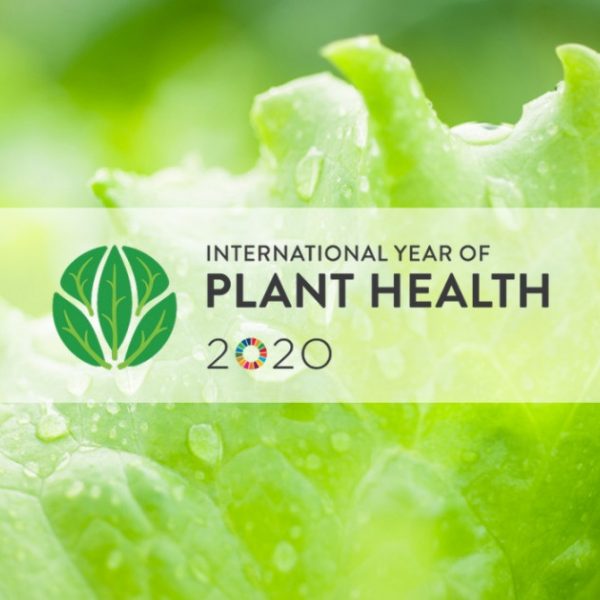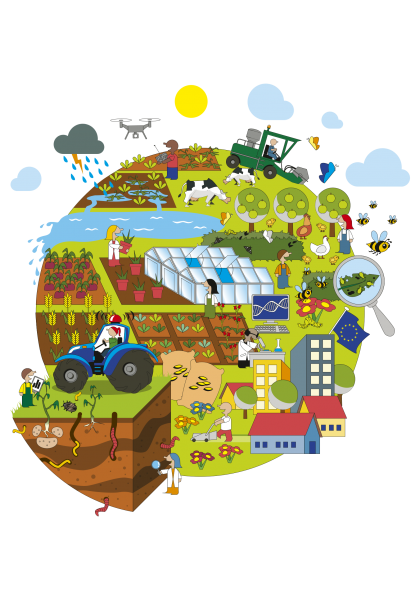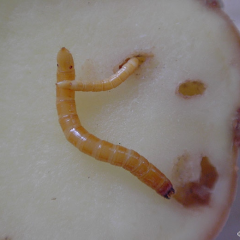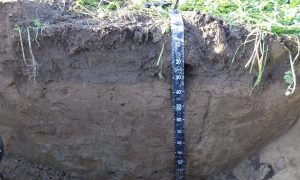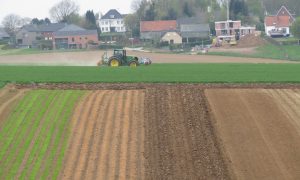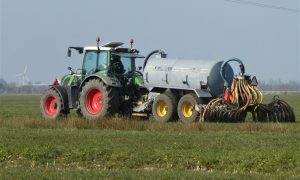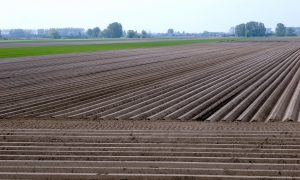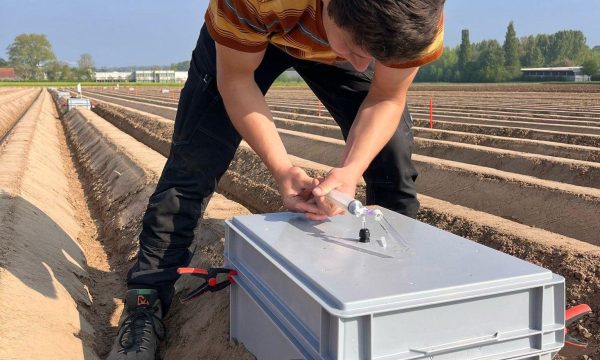Sector | Plant production Arable farming
“What can ILVO do for farmers?” The answer is here: a brief overview of relevant expertise, analyses, infrastructure, and the professional approach that characterizes ILVO. You can contact the Plant and Soil Living Lab for specific services and questions regarding collaboration.
Go to Plant and Soil Living LabQuick links
What does ILVO do?
-
ILVO studies the effect of crop management on the production of roughage (e.g. maize), food and industrial crops (e.g. chicory), protein crops (e.g. soy, (grass)/clover, alfalfa), and ‘new’ crops, such as sorghum and quinoa, using experimental and practical research. ILVO searches for the right soil condition, fertilization, and crop protection with the aim of optimal crop production with a limited impact on the environment (air, soil, water).
> Take a look at the ILVO crop information sheets
-
ILVO investigates the potential of new crops for Flemish farms. This includes research into yield, cultivation techniques, profitability, nutritional value of feed and food, and the environmental impact of the new crops, but also chain development and expertise in innovation process assistance.
> Take a look at the ILVO crop information sheets
-
ILVO breeds forage grasses, clovers, soy, groundcover crops, and industrial chicory for the climate of the future with attention to biotic and abiotic stress tolerance, efficient use of nutrients, and feed or nutritional value. Traditional breeding techniques are complemented by new techniques, such as molecular markers, embryo rescue, polyploidization, protoplast fusion, Crispr/Cas, and drone images, for high-throughput phenotyping and monitoring of crop growth and development. The focus here is on the development of more robust cultivars, such as drought-tolerant grasses, and/or cultivars with interesting characteristics, such as soy with a high protein content.
> More info: ilvogenomics.be
> More info about ILVO’s climate research: Center of Expertise for Agriculture and Climate (in Dutch)
-
ILVO is responsible for the Belgian descriptive and recommended list of varieties for chicory, feed crops, and groundcovers. Not only does ILVO have the site in Melle-Merelbeke at its disposal for this purpose, but it also has field services where trials are being carried out in other Flemish regions with different soil textures.
> Take a look at the ILVO comparative variety lists (in Dutch)
-
ILVO investigates the relationship between the growth and development of crops and environmental factors. An important aspect of this research is the response of plants to a changing climate. We use insights from ecophysiology (e.g. plant-water relationships) and model the effect of current and expected future environmental conditions (e.g. drought) on plant growth and development. For this, we use high-throughput crop phenotyping based on image analysis.
> More info about ILVO’s climate research: Center of Expertise for Agriculture and Climate
-
Through lab analysis, incubation, and greenhouse and field experiments of new organic and mineral fertilizers, ILVO examines the value of these for arable crops. NPK fertilization trials help to determine the agricultural and environmental optimum.
-
ILVO focuses on multiyear experimental and practical research to test combinations of soil improvement measures, such as different fertilization forms, soil cultivation (e.g. tilling vs. no tilling), soil improvers (e.g. compost), groundcovers, and crop rotation. By doing so, we investigate the effect on soil fertility, soil structure, soil life, nutrient dynamics, and crop performance. ILVO has a specialized lab for the analysis of chemical, physical, and biological soil quality parameters. ILVO also researches the causes of and solutions for soil degradation, and has specific expertise in erosion, compaction, and loss of soil organic matter. Research into soil management and cultivation techniques with a view to sustainable carbon and water management is one of the spearheads of ILVO climate research.
> More info about ILVO’s climate research: Center of Expertise for Agriculture and Climate
-
ILVO has a licensed composting site and makes its expertise in farm composting available to practical research centers and individual farms. ILVO also conducts research into the composition, the process, and the quality of the end products of composting and fermentation of organic waste streams, including animal manure.
-
ILVO’s Diagnostic Center for Plants analyzes samples of soil, water, and plants for the presence of pests, mites, nematodes, viruses, bacteria, and fungi. Moreover, by studying the biological cycle of these organisms, plant physicians look for sustainable control techniques. The emphasis is on prevention, crop technical measures, and biological control for application in integrated pest management (IPM). The interactions between plant, pathogen, and soil or substrate are also investigated in this context. After all, using disease-resistant and resilient plants in healthy soil or substrate can prevent the need for crop protection products over time.
> More info: Diagnostic Center for Plants
-
ILVO conducts research into irrigation techniques, plant-soil interactions, and water use in agriculture. Literally making room for water is central here, so that water has the chance to infiltrate the soil, so it can be buffered for dry periods, and so it can be collected for reuse. Water is an important spearhead in climate research at ILVO.
> More info about ILVO’s climate research: Center of Expertise for Agriculture and Climate
> Also read about Water in agriculture
-
Technological developments, such as sensors and their applications in precision agriculture, are essential for the further optimization of production systems as well as for making them more sustainable. ILVO develops and validates sensor technology for concrete practical challenges and processes data from various sensors into useful applications that support decision-making. There are many potential benefits: site-specific fertilization and spraying, more accurate forecasts for planning and delivery, increased traceability and transparency, and generally better-informed business decisions. Concretely, ILVO is investigating the potential of drone technology for crop monitoring, among other things.
> More info: Living Lab Agrifood Technology
-
Through the development of a robot framework, ILVO wants to put knowledge about robotics into practice and also give smaller farms, which need flexibility and cost efficiency, access to automation.
ILVO also has a fully equipped workshop and an experienced team to design, build, and evaluate prototypes for automation and robotization in a practical environment.
> More info: Living Lab Agrifood Technology
-
ILVO is internationally known and praised for its research into mechanization and spraying technology with the aim of more sustainable application technology for crop protection products and fertilizers. ILVO is also responsible for the execution of the mandatory inspection of spraying equipment in Flanders and has a BELAC‐accredited Spray Tech Lab equipped with the latest calibration technology.
> More info: ILVO’s Spray Tech Lab
-
ILVO conducts research into the impact of crops and cultivation techniques on environmental aspects, such as emissions, leaching, and biodiversity. ILVO also explores the possibilities of new cultivation systems, such as agroforestry, and rethinks cultivation and production from an agro-ecological point of view.
> See also what ILVO does for organic agriculture
-
Genomics embraces the study of genes and genomes, i.e. the hereditary material of a plant. ILVO can determine the sequence of the DNA of an individual or a group of individuals at relatively low cost using so-called high throughput sequencing. Thanks to ILVO's genomics platform, ILVO has all the knowledge in-house to generate and analyze such data (bioinformatics). This knowledge is then used to develop molecular markers that are useful for breeding, to detect pathogens, and to gain functional insights around genes that have an impact on e.g. growth, flowering, and drought stress.
> More info: ilvogenomics.be
-
ILVO strives for economic security and a more stable income for all links in the agrifood chain via economic business and sector analysis, research into profitability, added value, market competition, sales organization, consumer preferences, and the role of cities and municipalities. ILVO builds useful web applications and tools to help convert the theoretical knowledge from our research into recommendations that support business decision-making.
How does ILVO work?
Your point of contact: the Plant Living Lab
The Plant Living Lab at ILVO aims to respond to the needs and questions of the agro-food sector. They focus on sustainable, innovative technologies to optimize crop efficiency and at the same time, reduce the environmental impact. The extensive expertise and infrastructure and a wide stakeholder network make a high-quality, strong, multidisciplinary approach to this research possible.
Your ILVO guarantee
- Scientifically-based solutions
- Individual and/or co-creative guidance for innovation trajectories
- Confidential treatment of your question
- Clear and easy-to-interpret results that are applicable to day-to-day operations
- Technological support for various farm processes
Specialized research infrastructure
- > 200 ha trial fields and an extensive range of rolling field trial machinery
- Vehicles and machinery for trials on location
- Permanent outside services for comparative variety research
- Modern farm machinery and infrastructure for precision agriculture
- 50 ha organic trial fields and an agro-ecological trial platform
- > 15.000m² greenhouse infrastructure and climate chambers for research, including for quarantine organisms
- 'Rainout shelters' for research on drought stress in plants
- Belgian and EU reference labs for plant pests and pathogens: the Diagnostic Centre for Plants
- An accredited lab for soil, substrate and plant analyses
- An accredited lab for spray technology
All ILVO expertises at your service
ILVO works in an interdisciplinary fashion and has a network of living labs that work closely together. A problem or question is therefore examined from many different angles by ILVO experts from different disciplines. This is guaranteed by ILVO's broad and systematic approach, together with the typical openness of the ILVO culture.
Contact an expert
